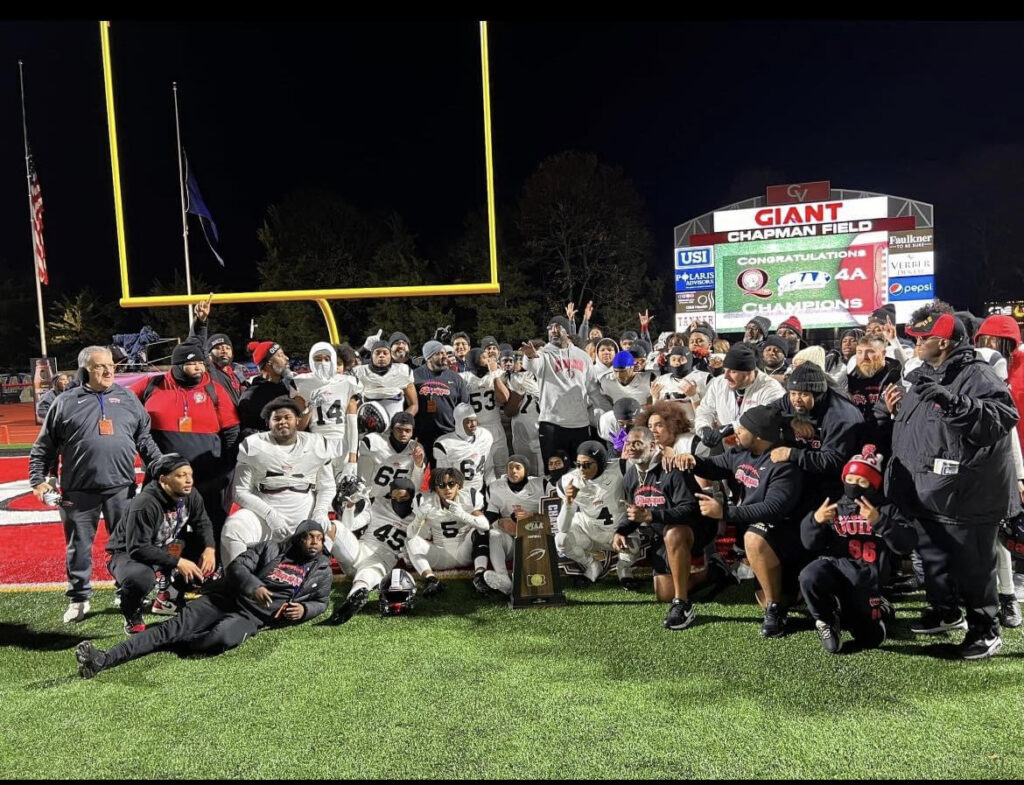ALIQUIPPA, Pennsylvania — One month after the Aliquippa High School football team finished the season with a perfect record and a state championship, the Pennsylvania Interscholastic Athletic Association ruled it would have to play up a class for the next two seasons.
Based on its enrollment of 156 boys, Aliquippa High should have been in Class 2A, but the PIAA used a “competitive balance formula” to move it to 5A. The new classification means Aliquippa, with a student body that is largely black and low-income, will compete against suburban, mostly upper-middle class school districts that have enrollments of between 424 and 619 boys.
Rob Matzie, the state house Democrat who has represented this city for decades, explained that the competitive balance formula includes postseason successes, such as back-to-back state championships, and the number of transfers. Matzie said he is furious about this ruling.
“Four years ago, the PIAA moved Aliquippa from 3A to 4A and tried last year to move them to 5A,” he explained, adding, “The school appealed based on player safety. They don’t have that many kids coming off the bench competitively to the other teams they are facing, and the PIAA said OK.”
Matzie said Aliquippa won that appeal at that time based on health and safety, yet suddenly, after back-to-back state titles, the PIAA wanted to bump it up again.

“And lo and behold, they’ve now changed the rules, and health and safety are no longer part of the appeal process, which I believe is asinine,” Matzie said.
Matzie said the roles of the board of the PIAA are to determine eligibility, run championships, and determine classifications. He wants to know what consideration the board is paying to the student-athletes’ lives.
“They are saying now that health and welfare doesn’t matter and not taking into consideration that a cookie-cutter approach doesn’t work for communities like Aliquippa, where dire socioeconomic issues have kids looking for a safe place to sleep at night,” he said. “These kids punch up above their circumstances, their competition, and find purpose on that field, but also give this community a sense of purpose back.”
Fifty years ago, Aliquippa was a boom city, and Franklin Avenue, from one end to the other, was right in the center of that boom. If you needed a nice suit for church or a wedding, there was a men’s store. A nice hat and dress could be found at the local dress shop. There were also small local department stores, a flurry of bakeries, Carmen’s TV and Appliance shop, barber shops, hair salons, churches, and a half-dozen social fraternities.
That bustling Main Street was a direct result of the 7-mile stretch of the Ohio River bank where the sprawling Jones and Laughlin Steel complex once employed more than 17,000 workers. The LTV corporation bought Jones and Laughlin in 1968, but within 20 years, the steel industry had collapsed, and so had LTV.
Aliquippa didn’t just deteriorate because of the fall of the steel industry. The natural migration of workers to the suburbs contributed to that when workers became more prosperous. Over the past few decades, several organizations have been formed to revitalize the city’s industry and commercial base, but nothing has ever really stuck.
Today, outside a handful of steeples and the faithful who fill their pews, it is the football team that is the glue that holds this city together. People schedule their lives around home games. When the boys go to the playoffs, the entire city, including former players and first responders, all line up to cheer them on.

The population has cratered from 20,000 to under 9,000 — 39% black and 58% white, with a large portion of the population living below the poverty line. The public school district’s enrollment is nearly 80% black, and that makes Matzie think something he doesn’t want to think.
“I don’t want to say it’s true or not because I don’t have facts to back it up, but it screams of some racism, I’m not going to lie,” he said, adding, “Part of the problem is, I think, I don’t know if anyone from the PIAA has ever walked down Franklin Avenue or been anywhere like Franklin Avenue, and that is why I don’t think they understand where these kids come from and the excellence they had to have to punch up two class divisions already, let alone a third.”
Matzie is the vice chairman of the Pennsylvania Athletic Oversight Committee. He said when he announced Friday that he would be introducing a bill calling for a review of the PIAA’s policies, practices, structure, and finances, he was flooded with support from an unusually bipartisan group in the legislature.

“Private schools can recruit players from all over the United States, but a small, urban school district that has so many things working against the kids is now being punished for being successful, for seeking excellence, by a governing body tasked with being fair,” he said. “Well, that bears looking into everything.”
The rallying cry for the community and for the storied football program hasn’t just stayed within the boundaries of Western Pennsylvania. The Aliquippa “Quips” are so storied that the team and the town were scouted for the 1983 high school football film All the Right Moves starring a young Tom Cruise. And, while Johnstown was ultimately picked, Aliquippa coach Don Yanessa had a cameo role as an opposing coach and served as the film’s technical adviser.
David Urban was a high school football star in the 1980s in neighboring Hopewell Township. The Quips were his school’s annual arch-rivals. He said it is patently unfair to penalize a team for being excellent.
“I don’t know how many people have walked down Franklin Avenue recently on that PIAA board, but that team is the pride of Aliquippa, and it’s been the pride of Aliquippa since I graduated in 1982,” said Urban, a U.S. Military Academy graduate.
Urban said what the board did was patently unfair to the students and the community.
“I mean, if you want to crush kids’ lives and dreams and hopes right, do what the PIAA are doing to them,” he said, adding, “They are also punishing them for being successful in a place where success comes hard and dreams die hard.”
The matter has swept the region and caught the passion of popular local sports talk host Colin Dunlap, who has rallied the area around both the unfairness and stridency of the PIAA ruling. He said last week that this is not about the starting 11 players on the roster because they are ready to fight and ready to go. Instead, it is about when one or two get hurt, and then you have a sophomore on the bench who weighs 185 pounds playing against rosters filled with players in the 280-pound weight class.
“He is trying his a** off, but he is going to be put in the dirt every time,” Dunlap said. “That is the problem, and the failure to understand … in a very violent sport like football, injuries happen. For grown adults to not comprehend that is just not right.”
Matzie said the bottom line is it seems as though the people on the board don’t know anyone like the boys who play for the Quips, nor do they know anyone who comes from their circumstances.

“You cannot cookie-cut this as a one-size-fits-all situation, and that is why I am working on legislation to see exactly what is going on with this board,” Matzie said.
CLICK HERE TO READ MORE FROM THE WASHINGTON EXAMINER
Ask anyone around here, and they’ll tell you it goes God, family, and high school football — and depending on the day and how your family is behaving, football might supersede family.
“I’d add hard work to that list,” Matzie said, adding, “And that is what we are going to do, work hard to get to the bottom of this.”
